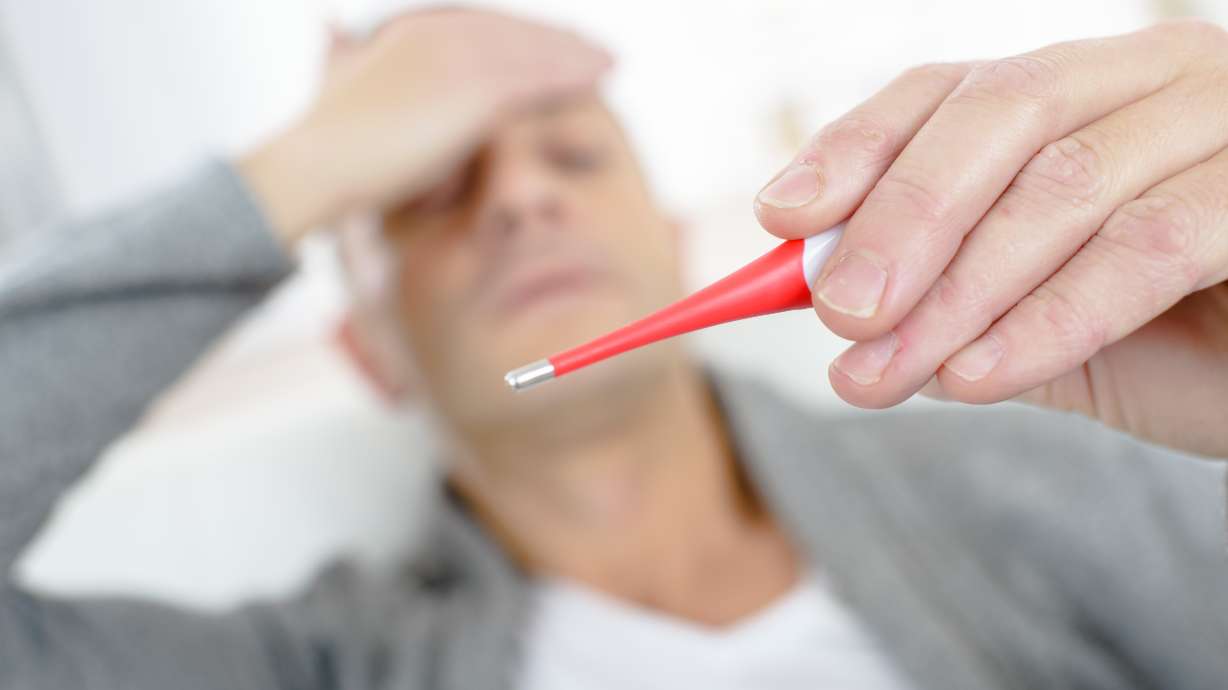Estimated read time: 4-5 minutes
This archived news story is available only for your personal, non-commercial use. Information in the story may be outdated or superseded by additional information. Reading or replaying the story in its archived form does not constitute a republication of the story.
SALT LAKE CITY — You feel a fever coming on. You've developed a mild cough. You feel sluggish, run down.
Common cold? Or the new coronavirus?
The COVID-19 pandemic, which originated in China last year from a novel form of coronavirus, is introducing a new level of uncertainty to every illness these days — especially since cases began popping up in Utah.
Maybe you're fine — but if you do have COVID-19, shouldn't you act right away? Self-isolate? Tell the health department?
As of Friday, the Utah Department of Health had tested almost 140,000 Utahns for the novel coronavirus and confirmed 5,919 cases. That means over 95% of those tested were negative and may have been experiencing symptoms of something else, like the flu.
Still, Utah health officials are now urging residents to be tested if they exhibit even one symptom of COVID-19; this will assist the state's efforts to track the virus and its spread, which is doubly important now that businesses are beginning to reopen.
"Public health relies on understanding exactly who has COVID-19 to inform not only policies, but also our public health interventions," said state epidemiologist Dr. Angela Dunn in an April 16 video.
The symptoms that warrant a COVID-19 test in Utah are:
- Fever
- Cough
- Shortness of breath
- Muscle aches and pains
- Loss of smell or taste
- Sore throat
Dunn encouraged anyone with one or more symptoms to be tested, "no matter how mild" they are. The Centers for Disease Control and Prevention released new symptom guidelines that also add chills, repeated shaking with chills and headaches to the list of symptoms. Those three currently don't prompt testing in Utah, Dunn said on April 27.
"We don't currently have that in our case definition, but I still think we capture everybody who could possibly have COVID-19 and we'll work with our testing team to determine in that's a reasonable thing to add," she explained.
How to get tested
Fortunately, there are now more ways to be tested than ever before. On Saturday, there will be free testing at the Utah State Fairpark from 1-7 p.m. for residents who call ahead for a 10-minute time slot. Interested Utahns can reserve a time at 801-436-7118.
If you can't make it Saturday, there are other ways to get tested, including the Wellness Bus, a great resource from @UofUHealth. Go to https://t.co/1j9TB1YLls to find weekly locations. If you have insurance they’ll bill it, but otherwise testing is free and doesn’t require ID
— SLC Mayor Erin Mendenhall (@slcmayor) May 6, 2020
University of Utah Health operates a Wellness Bus that is being used as a mobile testing center for COVID-19.
The Utah Department of Health has created a map of testing site locations throughout the state. While sites are concentrated along the Wasatch Front, there are also testing locations in cities like Roosevelt, Moab, Blanding and Kanab.
A tool on the site allows users to enter their address and find the testing location nearest them.
The sites are run by various entities and organizations — regional hospitals, Intermountain Healthcare, University of Utah Health and Silicon Slopes' TestUtah among them — so the map includes specific guidance and relevant contact information for each site. Most ask that you call ahead before coming to be tested.
Several organizations have established hotlines where Utahns can call ahead or get more information about COVID-19:
- Utah Department of Health: 1-800-456-7707
- Intermountain Healthcare: 844-442-5224
- University of Utah Health: 801-587-0712 or 844-745-9325
Additionally, TestUtah has developed a questionnaire to screen Utahns for COVID-19 symptoms and give them further direction. The University of Utah Health site has charts comparing COVID-19 symptoms against those for the flu, colds and allergies.
Under the Cornavirus Aid, Relief, and Economic Stimulus (CARES) Act, all coronavirus tests should be covered by insurance. TestUtah tests are free under a contract with the state.
Intermountain describes the tests as "swabbing deep inside your nose or throat, which can be uncomfortable or even painful."
Utahns experiencing severe symptoms should call 911.
While experiencing symptoms, or after receiving a positive test notification, Utahns should stay in a specific room away from other people and pets in the household, according to the Centers for Disease Control and Prevention. Get rest, stay hydrated, and take over-the-counter medications like acetaminophen to feel better.
If someone with COVID-19 has not experienced a fever for at least three days, other symptoms have improved and symptoms first appeared at least 10 days ago, they can leave home again under CDC guidelines.
So to summarize, if you think you have COVID-19, there's a good chance it's something else — but you should be tested anyway. The more Utahns who are tested, the faster health officials will get a handle on the disease, its spread, and how to fight it.
Submit Your Questions:










